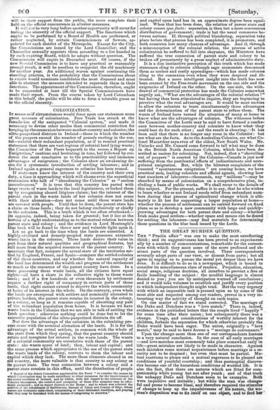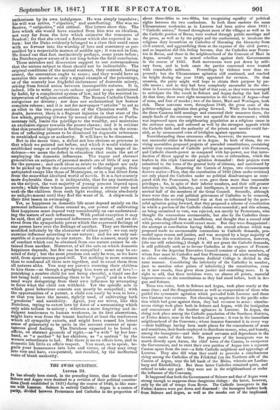THE GREAT MURDER QUESTION.
THE " Praslin affair " was one to make the most unreflecting think ; and its suggestiveness has been proved to us experiment- ally by a number of communications, remarkable for the earnest- ness with which they moot some of the more profound and ab- stract parts of the question involved. These correspondents severally adopt parts of our view, or dissent from parts ; but all agree in urging us to pursue the moral yet deeper than we have done. It is difficult to do so in a newspaper, which is bound to consider its miscellaneous class of readers. Prejudice, education, social usage, religious doctrine, all interfere to prevent a free or facile handling of the subject : the needful language is almdst denied to you ; you are by anticipation warned off conclusions ; and it would take volumes to establish and justify every position to which independent thought might tend. But the very urgency with which an impossible task is pressed upon us by some of the
i most able and respected among our readers, proves in a very in- teresting way the activity of thought on such topics.
On one matter of fact we stand corrected. The marriage of the Duke and Dutchess was a "love match." There is, indeed, evidence in the published letters that the couple lived " happily " for some time after their union ; but subsequently there was a change. Usage, and considerations of worldly interest for the children, forbade the separation for which otherwise probably the Duke would have been eager. The union, originally a "love match," maybe said to have become a " manage de convenance." Upon the change more than one of our correspondents hastens to a very natural conclusion. In the case of all early marriages —and love matches most commonly take place somewhat early in. life—great mistakes are likely to be made in character. Against such mistakes some mutual acquaintance before marriage is a se- curity not to be despised ; but even that must be partial. Mu- tual exertions to please and a mutual eagerness to be pleased are conditions of youthful courtship ; and thus postnuptial discove- ries become one of the hazardous conditions of wedded life. It is also the fact, that there are natures which are fitted for com- panionship while young but not after youth ; and of that truth. the unhappy Duke and Dutchess seem to be examples. Both were impulsive and irritable ; but while the man was change- ful and prone to become blasé, and therefore required the stimulus of change to keep up the impulsiveness of his nature, the wo- man's disposition was to fix itself on one object, and to feed her
enthusiasm by its own indulgence. He was simply impulsive ; his will was active, " objective," and unreflecting. She was re- flective, " subjective," and critical. Her letters show this. The love which she would have exacted from him was an idealism, not very far from the love which animates the romances of Scuderi ; for that she owned a fervour which she expected in re- turn: but the Duke evidently belonged to a class that could enter with no fervour into the worship of love and constancy as per- sonified by a respectable matron of middle age; it was not in him. He found out that fact, instinctively perhaps, some years before; the Dutchess grew aware of it not long before the fatal conclusion. These mistakes and discoveries suggest to our correspondents that the unions subject to them should not be indissoluble. The original conditions of the mutual contract, they contend, having ceased, the convention ought to cease ; and they would have us moralize this murder as only a signal example of the poisonings, or of the scarcely less frightful endurances of domestic misery, arising from forced union between incompatible natures. It is, indeed, idle to write currente calanto against usage maintained by habit, by a complicated system of law, and by the received in- terpretation of religious authorities. The Roman Catholic Church recognizes no divorce ; nor does our ecclesiastical law bestow complete release; and it is not for newspaper "articles" to act as an edict to the two great sections of the Christian world. No doubt, however, there is a flagrant injustice in that state of the law which, granting divorce by means of dispensation or Parlia- mentary bill, limits the privilege to the wealthy, and maintains an exclusive rigour towards the poorer classes; and it is evident that thisipractical injustice is forcing itself too much on the atten- tion of reflecting persons to be dismissed by dogmatic references to established usage or authority. It will have to be discussed. But in the mean time, a defect not less obvious or grievous is that which we pointed out before, and which it would violate no established usage or authority to supply, except the usage of in- dolence—we mean the defect in education that omits the art of employing the domestic influences. The vague and abstract generalities on subjects of personal morals are of little if any use for the purpose ; and such ideas as relate to the subject are only to be picked up from the conversations of reflecting people, from antiquated essays like those of Montaigne, or in a less direct form from the somewhat idealized world of novels. It is a fact scarcely more deplorable than it is indisputable, that for any instruction on the subject, the vast majority of young persons depend upon novels ; while those whose parents maintain a stricter rule and exclude the children from such light reading, obtain absolutely no'enlightenment until they feel the want of it. A shipwreck is their first lesson in swimming. Yet, as happiness in domestic life must depend mainly on the personal influences of those around us, our power of cultivating that happiness must depend very considerably on our understand- ing the nature of such influences. With partial exception it may be said, that all great personal influences are mutual, and are de- rived from the sympathetic power which the expressed feelings of one person have over the feelings of another. They are therefore modified infinitely by the character of either party : we can only exercise influence according to our nature; and we are only sus- ceptible of it according to our nature. In like manner, many acts of conduct which can be obtained from one nature cannot be ob- tained from another. Moreover, of all the acts on which domestic happiness depends, but few can be compelled : some may be ex- acted of duty ; but the most precious can only be won, as we have said, from spontaneous good-will. Yet nothing is more common than to confound all these acts together, and to exact them from all natures alike. You may see parents coercing their children to kiss them—as though a grudging kiss were an act of love!— punishing a sombre child for not being cheerful, a timid one for not being bold ; commanding them to be " good," and in a thou- sand ways derogating from their own influence by attempting to force what the child can withhold. Yet the specific acts in which good behaviour consists can mostly be compelled ; with the opportunities of a parent, a child can easily be won to love ; so that you have the means, rightly used, of cultivating both " goodness" and amiability. Again, you see wives, like this Dutchess, trying to extort love by force of a sermonizing which only adds tedium to satiety ; whereas a more forgiving and in- dulgent tenderness to human weakness, in its first aberrations, might have won from the truant husband at least the tenderness which all sympathy extorts, and might have roused his latent sense of generosity to be quits in the account current of spon- taneous good feeling. The Dutchess expected to be loved ex officio, on abstract grounds of right,—as "a wife" by her hus- band, as "a mother" by her children, as "a matron" by the women subordinate to her. But there is no ex officio love, and in domestic life little ex officio respect. You must, so to speak, be- guile your housemates into love and virtue, or they may stray into vice and hate, exasperated, not recalled, by the ineffectual voice of blank authority.



























 Previous page
Previous page